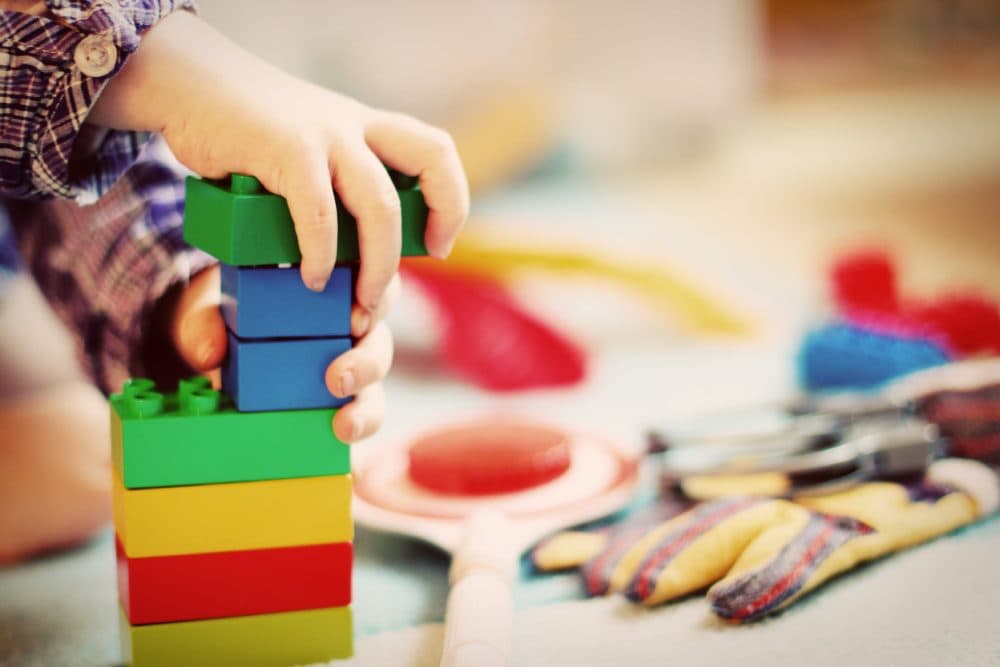Advertisement
Buffalo Teachers Say Having To Change Kids' Diapers Is A Bum Deal

Pre-K and kindergarten teachers have a lot to do: teaching early literacy, numbers, interpersonal skills — and in some states, changing diapers.
While the majority of school-aged children are toilet trained by the time they get to preschool at around 4 years old, many kids aren't, and many school districts can't legally refuse them and their diapers. That's now being debated in Buffalo, New York, where some teachers say the number of non-toilet trained students in their classrooms is climbing, stretching teachers and their aides thin.
"The teacher aides here say that it's not their responsibility [to change diapers,]" says Phil Rumore, president of the Buffalo Teachers Federation. "So what we have then is a student that's actually — and we have about 43 of them in Buffalo, mostly in kindergarten and pre-K — that are actually being embarrassed, stigmatized, teased by their peers."
As discussion continues about how to address the problem and where the responsibility falls, Rumore tells Here & Now's Robin Young that kids' well-being must come first.
"We have to focus on the child and how we can help the child and the parents to help potty train the child, because let's face it, whenever the child has an accident in class, the rest of the kids will tease the child, the child is stigmatized," he says. "The No. 1 concern should be that child, and how do we get that child potty trained so that they are no longer stigmatized and they can function?"
Interview Highlights
On the origins of this issue in Buffalo
"The genesis came from an increase in the number of students that are coming to school that haven't been toilet trained or potty trained, and there is no policy in place, or procedure in place, to work with the child to either potty train them, to clean them when they have an accident, et cetera, because the teacher can't do it because it takes away from the class."
"I'm not blaming the parents ... because in some cases we have an autistic child, or we have a child with emotional problems or physical problems."
"Most of it is concentrated in kindergarten and pre-K. However, we have some students that are 5, 6 and 7 years old that are having a similar issue."
Phil Rumore
On finding that 43 students in the school district are struggling with toilet training
"The district told the Board of Education that there were only about six or eight students in the district. When we heard that, we knew that that wasn't correct, and this is one of the reasons that we did the study — and this was only a one-week study, I'm sure there are more than 43. Most of it is concentrated in kindergarten and pre-K. However, we have some students that are 5, 6 and 7 years old that are having a similar issue."
On feedback from teachers in the survey, including from one teacher who said they've had two assistants quit over not wanting to change soiled pullups
"That's why it's absolutely critical to have somebody that's trained to help and to work with the parents, because once again you have to focus on, what's the best for the child? And what's best for the child is that everybody has to be together. We have to find a way of working with the parents to do this, because ... this isn't something like math that you can teach your number facts in school."
On who ought to be charged with addressing the problem
"Obviously it can't be the teacher, because the teacher can't leave the classroom. So what there has to be is a special health care aide. Every school should identify one or two teacher aides who want to do it, who are then trained how to work with the parents in how to toilet train the child, and who also have the requisite immunizations to take care of it. There should be a policy that everybody knows. They really should be paid extra, too, because it's something that I think is beyond a job title of anybody to do it. There should always be two people present. There aren't appropriate materials that are there. There are no pullups for the students, you also have to have the facilities and also the supplies that you need for the children. It's something that should have been done many years ago and has to be done now, because it seems to be getting to be more of a problem."
Karyn Miller-Medzon produced this interview and edited it for broadcast. Jack Mitchell adapted it for the web.
This segment aired on January 15, 2019.
